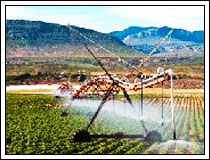| Home > Agricultural Wastewater |
Agricultural Wastewater
Agriculture has played a key role in the development of human civilization. Even in the first world countries, agriculture is considered a highly intensified industry.  Being such a big industry it is responsible for producing a large amount of wastewater every year that demands a variety of treatment technologies and management practices. The agriculture industry itself produces so much of wastewater that in recent years, there has been a backlash against perceived external environmental effects of mainstream agriculture, particularly regarding water pollution, resulting in the organic movement. Being such a big industry it is responsible for producing a large amount of wastewater every year that demands a variety of treatment technologies and management practices. The agriculture industry itself produces so much of wastewater that in recent years, there has been a backlash against perceived external environmental effects of mainstream agriculture, particularly regarding water pollution, resulting in the organic movement.
However, it has to be mentioned that agricultural wastewater can easily be treated by employing biological processes in which the activity of microorganisms such as bacteria, algae, fungi, plants and animals is involved. In general the water treatment system for agricultural wastes consist of biodigesters and aquatic plant channels. The bio-digester expeditiously turns the pollutants and microorganisms into biogas or aquatic plant biomass as it passes through it.
Source of Agricultural Wastewater
There are basically two main sources of wastewater in agriculture. These are:
- Non-point Source Pollution
- Point Source Pollution.
|
|
| |
 |
Non Point Source Pollution
Non Point Source Pollution results from surface run offs from fields especially in rainy seasons. This is a major source of pollution and sometimes the only source too. Some types of non-point source pollution are :
- Sediment Runoff: This refers to the washed off soils that cause high levels of turbidity in water bodies, which encourages the growth of aquatic plants, clog fish gills and smother animal larvae.
- Nutrient Runoff: Nitrogen and Phosphorus are key pollutants found in runoff, which enter runoff from crop residues, irrigation water, wildlife, and atmospheric deposition. But their effects can be efficiently mitigated by implementing nutrient management plans.
- Pesticides: The pesticide used for pest control also gets washed away in heavy rains and becomes a threat to water quality.
|
|
 |
Point Source Pollution
Point Source Pollution is a localized source that constitutes animal waste, treatment, piggery waste, firewater, silage liquor, milking parlor wastes, slaughtering wastes and vegetable washing wastes. A point source has negligible extent, distinguishing it from other pollution source geometries.
|
|
|
|